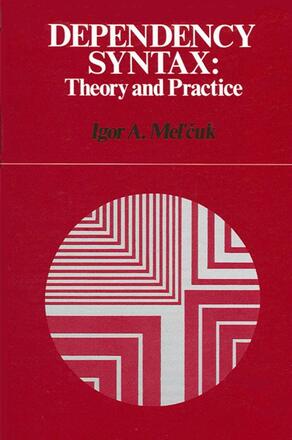Foreword
Mark Aronoff
Acknowledgments
List of Commonly Used Abbreviations and Symbols
I. Dependency Syntax: An Overview
Introduction
I. The Case "Dependency vs. Phrase Structure"
II. Organization of the Presentation
1. Basic Elements of Dependency Representation in Syntax
I. Introductory Remarks
II. Dependency Language vs. Phrase-Structure Language
III. The Rationale behind Syntactic Dependencies
IV. Current Fallacies Concerning Syntactic Dependencies
V. Some Insufficiencies of Syntactic Dependencies
VI. Some Advantages of Syntactic Dependencies
Notes
2. The Meaning-Text Linguistic Model as the Framework for Dependency Syntax
I. Basic Postulates and Main Properties of a Meaning-Text Model
II. Utterance Representation at Different Levels
III. Major Components of a Meaning-Text Model
Appendix: Two Sample Entries of the Explanatory Combinatorial Dictionaries of French and Russian
I. Sample entries
II. Translating Means of an ECD
Notes
II. An Important Concept of Dependency Syntax: Surface-Syntactic Relations
3. Types of Syntagmatic Dependencies Between Wordforms of a Sentence and Surface Syntactic Relations
I. Possible Types of Syntagmatic Dependencies between Wordforms of a Sentence
1. Morphological Dependencies
2. Syntactic Dependencies
3. Semantic Dependencies
II. Possible Combinations of Syntagmatic Dependency Types between two Wordforms of a Sentence
III. Syntactic Dependency: A Logical Analysis of an Important Concept
Notes
III. Syntactic Theory: The Ergative Construction
4. Is There an Ergative Construction in Dyirbal?
I. Introductory Remarks
II. A Few Facts About Dyirbal III. Grammatical Subject in Dyirbal
1. Toward the Concept of Grammatical Subject
2. Subjecthood Properties in Dyirbal
IV. "Transitive" Verbs in Dyirbal
V. "Accusative" in Dyirbal
VI. No Ergative Construction in Dyirbal
VII. Active, Passive and Other Voices and "Near-Voices" in Dyirbal
VIII. Analysis of Possible Counterarguments
Notes
5. Is There an Ergative Construction in Lezgian?
I. Introductory Remarks
II. A Few Facts About Lezgian
III. Grammatical Subject in Lezgian
1. Subjecthood Properties in Lezgian
2. Absence of Voice in Lezgian
3. Rejecting Possible Counterarguments
VI. No Ergative Construction in Lezgian
Notes
6. Toward a Definition of the Concept "Ergative Construction"
I. Introductory Remarks
II, The Term Ergative
III. Levels of Representation in the Study of te Ergative Construction
IV. Typology of Predicative Constructions
V. The Ergative Construction: Attempt at a Definition
VI. Origins of the Ergative Construction
Note
IV. Syntactic Descriptions: Surface-Syntactic Models and Notions
7. Toward a Formal Model of Alutor Surface Syntax: Predicative and Completive Constructions
I. A Few Facts about Alutor
II. Formalism and Notations Used
III. Nine Surface-Syntax Rules of Alutor
1. Predictive Constructions (Rules 1-3) 2. Completive Constructions with a Finite Transitive Verb in the Non-Resultive (Rules 4-9)
IV. Discussion of Predicative and Completive Constructions in Alutor
1. The Ergative Construction in Alutor
2. The Special Cases of Object Agreement of the Main Verb
Notes
8. Syntactic, or Lexical, Zero
I. The Problem Stated: Questions 1-3 II. From Morphological to Syntactic Zeroes
III. Syntactic, or Lexical, Zeroes in Russian
IV. "Zero" Terminology in Linguistics
V. Answers to Questions 1-3
Notes
V. Syntactic Methodology: Some Thorny Questions of Russian Syntax
9. On a Class of Russian Verbs that Can Introduce Direct Speech: Lexical Polysemy or Semantic Syntax? (Constructions of the type "Ostav'te Menja!" --Ispugalsja Bufetčik)
I. The Russian Direct Speech Sentences with Verbs of Emotion
II. The Problem Stated
III. Alternative Solutions: Lexical vs. Syntactic
IV. Three Arguments against the Lexical Solution
V. A Residual Case: Verbs of Emotion Having a Speech Semantic Component
Notes
10. Animacy in Russian Cardinal Numerals and Adjectives as an Inflectional Category: A Problem of Agreement
I. Introductory Remarks
II. The Problem Stated
III. Alternative Solutions: Animacy vs. a Specific Case
IV. Seven Arguments to Support the Animacy Solution
V. Important Residual Cases
1. In What Inflectional Forms of Adj and Num in Animacy Relevant?
2. For What Lexemes of Adj and Num in Animacy Relevant?
Notes
11. The Grammatical Case of the Numerical Expressions in Russian: Phrases of the Type (Bol'še) Na Dva Mal'čika or Po Troe Bol'Nyx: A Problem of Government
I. Constructions with "Difficult" Case Forms
II. The Problem Stated
III. Alternative Solutions: Nominative vs. Inanimate Accusative
IV. Four Arguments in Favor of the Accusative Solution
V. EXCURSUS: The Nominative Noun as a Syntactically Dependent Element in Russian
Notes
Four Methodological Principles of Linguistic Research
References
Indexes
Index of Names
Index of Languages
Index of Subject and Terms
